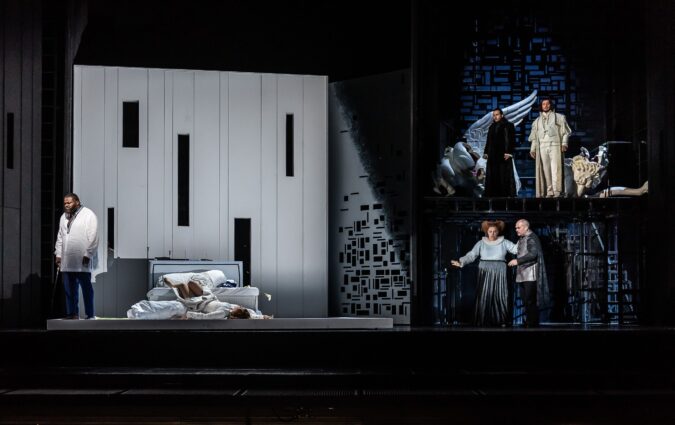 United Kingdom Verdi, Otello: Soloists, Chorus and Orchestra of the Royal Opera House / Daniele Rustioni (conductor). Royal Opera House, Covent Garden, 12.7.2022. (CC)
United Kingdom Verdi, Otello: Soloists, Chorus and Orchestra of the Royal Opera House / Daniele Rustioni (conductor). Royal Opera House, Covent Garden, 12.7.2022. (CC)

Production:
Director – Keith Warner
Revival director – Isabelle Kettle
Set design – Boris Kudlička
Costume design – Kaspar Glarner
Lighting design – Bruno Poet
Movement director – Michael Barry
Fight director – Ran Arthur Braun
Cast:
Otello – Russell Thomas
Iago – Christopher Maltman
Desdemona – Hrachuhí Bassénz
Montano – Blaise Malaba
Cassio – Piotr Buszewski
Roderigo – Andrés Presno
Emilia – Monika-Evelin Liiv
Lodovico – Alexander Köpeczi
Herald – Dawid Kimberg
I reported on Antonio Pappano’s conducting of Keith Warner’s production of Verdi’s Otello just pre-pandemic (review click here); now under revival director Isabelle Kettle, the production reveals more and more layers. It is certainly a staging of opposites: darkness dominates (as it does in the story) except for the Persil-white of Desdemona’s bedroom and moments of Spring. It is rare to see a staging where sliding panels work so well (although the winged lion that slides across the stage seemed less sure of itself on this occasion); Warner dares, also, to leave characters along in a ‘stage void’ that emphasises their loneliness., and/or their internal darkness The gesture of Iago, on his own at the opera’s beginning prior to the orchestral storm, with a theatre mask (which returns in his great ‘Credo’) carries great power.

Perhaps the performance will settle as the run continues. I was mightily taken by Daniele Rustioni’s conducting of Verdi’s Macbeth in November 2021 (review click here); almost but not quite as much so here. He paces the work well and clearly, again, sees its overall arch. A couple of moments of messy ensemble just contributed to the feeling that we are on the way to a substantive Otello but not quite there yet.
Fine though Ermonela Jaho was last time around as Desdemona, it was Armenian soprano Hrachuhi Bassénz that dominated the evening. Although Bassénz had previously impressed as in 2018 as Donna Elvira (Don Giovanni), this was another level. Her voice is clearly soprano but has elements of mezzo-like timbre, and so displays a strong lower aspect. More, she is capable of ravishing beauty and pathos (as in her ‘Willow Song’ and, particularly, her ‘Ave Maria’); we the audience felt every twist and turn of her manipulated emotions.
As Otello himself, Russell Thomas seemed slightly under-powered until the final scenes of the evening. Yet he certainly has stage presence. Much has been made of his being the first black Otello at Covent Garden (including an article in today’s The Times – 13 July, page 23 – in which he says he is ‘quite sad’ that in well over 200 performances, not one Otello for the Royal Opera has been black). While Thomas has performed the title role some 21 times so far in his career, this is the first time he has appeared in the UK with it. The topic of ‘blackfacing’ is certainly in the news at the moment already, given Anna Netrebko’s Verona Aida.
As far as Thomas’s dramatic assumption is concerned, listening from the very back of the stalls his voice often felt a size too small, his ‘Esultate!’ not really the ringing, clarion arrival Verdi surely intended, nor his later cries of ‘Sangue, sangue, sangue!’ (‘Blood, blood, blood!’’). There is no denying Thomas’s acting ability to convey emotional pain – we often felt Otello’s torment – and given the power of the final half hour, it is entirely possible audiences later in the run will enjoy more of that vocal congruence. But even taking his acting alone, it was difficult to believe his fury in the third act.
Last time around, it was Carlos Álvarez who gave simply the best Iago this reviewer has (so far) seen, the very incarnation of evil. Christopher Maltman offers a very different Iago. Plotting, certainly, manipulating, definitely; more of a politician’s delight in manipulating reality than the spawn of Satan, though. It is an interesting view, as we feel more of Iago the human; perhaps just a tad more malevolence would have sealed the deal.
Replacing Kseniia Nikolaieva as Emilia, Estonian mezzo Monika-Evelin Liiv (Jette Parker 2007-9) made a huge impression, a fine singer and actress and perfect foil for her Desdemona; and yet more than that. Dramatically, as the opera unfolded, one felt Emilia as a separate character, one that is intriguing and caring. Liiv’s voice is a joy, full, perfectly in tune and the perfect size for Verdi. Her repertoire includes Azucena (which on this evidence is eminently believable). The Cassio, Piotr Buszewski, was imposing both in stage presence and vocal delivery; Andrés Presno returned to take on Roderigo, confidently. Finally, Alexander Köpeczi devoured the role of Lodovico, the Ambassador from Venice.
There was perhaps a little of a feel of a near miss to this performance, one that could easily be remedied as the run continues. Definitely worth it for Bassénz and Liiv, though.
Colin Clarke
